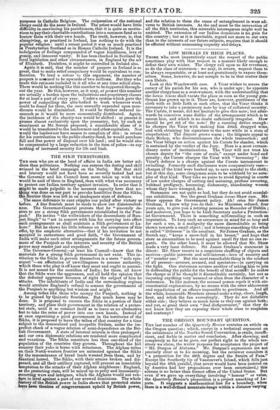THE SIKH TERRITORIES.
THE men who are at the head of affairs in India are better sol- diers than politicians. Nothing can surpass the daring and skill evinced in the brief campaign on the Sutlej. But that skill and bravery would not have been so severely tasked had not the Governor and his Council been more taken up with what would be said of them in England, than with what was necessary to protect our Indian territory against invasion. In order that it Estight be made palpable to the meanest capacity here that no- thing was done on our part to provoke hostilities from the Sikhs, the frontier there was left in an inadequate state of defence.
The same deference to cant cripples our policy after victory as before. A fine flourish must be made to show our disinterested- ness. The Governor-General protests that he " sincerely de- sires to see a strong Sikh government reestablished in the Pan- jaub." He invites " the wellwishers of the descendants of Run- jeet ,Singh" to " act in concert with him for carrying into effect such arrangements as shall maintain a Sikh government at La- hore.", But he shows his little reliance on the acceptance of this offer, by the emphatic alternative—that if his invitation be not accepted in earnestness and good faith, " the Government of India will make such other arrangements for the future govern- ment of the Punjaub as the interests and security of the British power may render just and expedient." The Governor-General--at least his Council—know that the materials for a strong Sikh government do not exist. This in- vitation to the Sikhs to govern themselves is a mere " nolo epis- topari "—an affectation of unwillingness to assume authority, which those who play it off know they must and ought to assume. It is not meant for the meridian. of India ; for there, all know Oat the Sikhs were the aggressors, and all hold the opinion that the defeated aggressor becomes of right the subject of him he attacks. The inhabitants of India and the surrounding regions would attribute England's refusal to assume the government of the. Punjaub to anything but wisdom and might. Among tribes like those who occupy the Punjaub, nothing is to be gained by Quixotic flourishes. But much harm may be done. It is proposed to amerce the Sikhs in a portion of their territory, and place their government in the relation of a protec- ted state, until it so conduct itself as to leave us no alternative but to take the reins of power into our own hands. Instead of at once organizing a good government in the territories of the Sikhs, it is proposed to leave the tribes of that country for a time subject to the demoralized and incapable Sirdars, under the im- perfect check of a vague relation of semi-dependence on the Bri- tish Government. A state of internal misrule is thus prolonged and our own diplomatic relations are rendered more complicated and vexatious. The Sikhs. constitute less than one-third of the population of the, countries they govern. Throughout the hill country their yoke is borne with reluctance. The Afghan tribes on their North-western frontier are animated against the Sikhs by the remembrance of broad lands wrested from them, and by fanatical hatred. The Sikhs, with their armies broken and dis- persed, and all their artillery captured, will present an irresistible temptation to the attacks of their Afghan neighbours : England, as the protecting state, will be mixed up in petty and incessantly- recurring wars and intrigues, which the Afghans would not ven- ture to level against a part of our avowed dominions. The whole history of the British power in India shows that protected states have been theatres of misgovernment upheld by British power, and the relation to them the cause, of entanglement in wars ad- verse to British interests. As the end must be the annexation of all the Sikh territories, this miserable interregnum might well be omitted. The extension of our Indian dominions is no gain for this country ; but as it is inevitable, regard not more to our own than to the interests of our future subjects, requires that it should be effected without unmeaning coquetry and delays.


























 Previous page
Previous page